Understanding eToro Fees and Charges in the UK

Adam Woodhead
Co-Founder
Adam is a Co-Founder and content creator for The Investors Centre. His key areas of interest and expertise are cryptocurrency and blockchain technology.
Twitter ProfileAuthor Bio

Thomas Drury
Co-Founder
Seasoned finance professional with 10+ years' experience. Chartered status holder. Proficient in CFDs, ISAs, and crypto investing. Passionate about helping others achieve financial goals.
Twitter ProfileAuthor Bio
Fact Checked
How we test
At The Investors Centre, we pride ourselves on our rigorous fact-checking process. To delve deeper into our meticulous testing procedures and discover how we ensure accuracy and reliability, visit our dedicated page on how we test.
Risk Warning
The information provided in this article is for educational and informational purposes only and does not constitute financial or investment advice. The future performance of cryptocurrencies, including the low-cap coins listed here, is inherently uncertain and subject to significant market volatility, regulatory changes, and technological developments.
Investing in cryptocurrencies carries a high level of risk, and you should only invest what you can afford to lose. Past performance of these coins does not guarantee future results. Conduct your own research (DYOR), consider seeking advice from a financial professional, and evaluate your risk tolerance before making any investment decisions.
Updated 01/01/2025

- 5,000+ Tradable assets
- Beginner friendly platform
- Copy trading feature
Quick Answer: What Are the 6 Types of Fees on eToro?
- Conversion fee: Non-USD deposits/withdrawals.
- Commission fee: \$1 or \$2 on stock trades from January 1st, 2025.
- Spread fee: Varies by asset.
- Overnight fee: For CFDs.
- Withdrawal fee: $5.
- Inactivity fee: $10/month after 12 months.
eToro is a multi-asset investment platform. The value of your investments may go up or down.Your capital is at risk.
eToro is a widely used trading platform in the UK, attracting both beginner and experienced traders with its user-friendly interface and diverse asset offerings.
However, understanding the fees and charges associated with trading on eToro is essential to maximising your returns. From conversion fees to inactivity charges, knowing what to expect can help you plan your trading strategy effectively and avoid unexpected costs.
In this guide, we will break down the various fees and charges on eToro to help you navigate the platform with confidence.
Our Opinion on the eToro Fees
From our experience, eToro’s fees are generally competitive, especially for commission-free stock and ETF trading. The 1% fee on crypto trades is transparent, but the overnight fees for CFDs can add up if you’re holding positions long-term. While the conversion and withdrawal fees are typical for the industry, they’re worth considering if you frequently move funds. Overall, eToro’s fee structure is fair, but being aware of all charges is essential for optimising returns.
Overview of eToro's Fee Structure
| Fee Type | Description | Cost |
|---|---|---|
| Conversion Fee | Applied to non-USD deposits and withdrawals. | Varies based on the currency. |
| Commission Fee | Charged on stock trades from August 2024. | $1-$2 depending on country and exchange |
| Spread Fee | Difference between buy and sell price with eToro markup. | Varies by asset. |
| Overnight Fee | Interest for holding CFD positions overnight. | Varies based on leverage. |
| Withdrawal Fee | Fixed fee for withdrawing funds. | $5 per withdrawal. |
| Inactivity Fee | Charged after 12 months of no login activity. | $10 per month. |
| Crypto Transfer Fee | Fee for transferring crypto to eToro Money Wallet. | 2% of transaction (min $1, max $100). |
| Crypto Buy/Sell Fee | Applied when buying or selling cryptocurrencies. | 1% per transaction. |
| Stamp Duty | UK stamp duty on stock purchases. | 0.5% of transaction value. |
| CopyTrader Fee | No extra fee, but standard trading fees apply. | Same as regular trading fees. |
| Smart Portfolio Fee | No management fee, but fees on underlying assets apply. | Fees on the assets within the portfolio. |
| CFD Rollover Fee | Fee applied when rolling over a CFD position. | Varies by asset and market conditions. |
| Leverage Fee | Extra costs associated with leveraged positions. | Varies based on leverage and asset. |
| Market Orders Fee | Potential spread costs applied to market orders. | Varies depending on market conditions. |
| Stop Loss Fee | Applied when executing a stop loss order. | Part of the spread cost. |
| Take Profit Fee | Charged when a take profit order is executed. | Part of the spread cost. |
| Crypto Wallet Transfer Fee | Fee for transferring crypto from eToro to an external wallet. | Varies by blockchain network fees. |
| Dividend Tax | Withholding tax on dividends for stocks. | Varies by country of the stock. |
| Account Maintenance Fee | No fee for account maintenance. | Free |
| eToro Money Fees | No deposit or SEPA transfer fees for eToro Money. | Free for eToro Money transactions. |
| Card Payment Fees | Applied to certain payment methods (outside the UK). | Varies by payment provider. |
Disclaimer
The information provided in this blog is for general informational purposes only and should not be considered financial advice. While we strive to ensure that the details, including fees and charges, are accurate and up-to-date, financial products and services may change without notice. We recommend that readers verify specific fee structures directly with eToro or their competitors before making any investment decisions. We are not responsible for any discrepancies or changes that may occur after the publication of this content. Always conduct your own research or consult with a financial advisor to ensure that you fully understand the fees and risks involved.
What Are eToro Fees and Charges?
eToro offers a range of trading services across different asset classes, and each service has its own associated fees. Understanding these charges is key to managing costs effectively and optimising your returns. Below, we delve into the specific fees for crypto, stocks, ETFs, CFDs, and more.
Crypto Fees
eToro charges a transparent fee of 1% on all cryptocurrency buy and sell transactions, applied directly at the time of the trade. Additionally, when transferring crypto from the eToro platform to the eToro Money Wallet, a 2% transfer fee is charged, capped at a maximum of $100 per transaction. Blockchain network fees also apply and are deducted from the crypto balance. For CFDs on cryptocurrencies, overnight fees are charged for holding positions overnight, and these fees vary based on the leverage used. Non-leveraged crypto positions may avoid some of these additional charges, providing a more cost-effective way to invest.
Stock & ETF Fees
Starting from August 2024, eToro will introduce commission fees for stock trades, with fees set at \$1 or \$2 depending on the user’s country and the stock exchange involved. However, ETFs remain commission-free, which applies to all methods of trading, including manual trades, CopyTrader, and Smart Portfolios. It’s important to note that while ETFs are commission-free, any leveraged or short-selling positions on stocks or ETFs are executed as CFDs, which incur separate fees, including overnight charges and spreads.
CFD Fees
CFD trading on eToro involves two key fees: the spread fee and the overnight fee. The spread fee represents the difference between the buy and sell prices and varies depending on the asset being traded. Overnight fees, also known as rollover fees, apply when positions are held past a specific time, usually reflecting the interest on the leveraged portion of the trade. For example, a short CFD position on a stock will incur spread costs at the time of trade execution and overnight fees if held beyond the trading day. These costs can add up, especially for long-term positions, so it’s vital to monitor them closely.
FX Fees
When trading forex on eToro, the main cost you’ll encounter is the spread fee. This is the difference between the bid and ask prices and can vary significantly depending on the currency pair being traded and market conditions. Unlike some other trading platforms, eToro does not charge additional commissions on forex trades, meaning the spread is the primary cost you need to consider. However, if you use leverage, overnight fees may also apply.
Conversion Fees
eToro accounts are based in USD, so any deposits or withdrawals in other currencies are subject to conversion fees. These fees vary depending on the currency and the payment method used. For example, converting GBP to USD when depositing funds might incur a small percentage fee, which can add up if you are frequently moving money in and out of your account. To minimise these costs, some traders choose to hold their funds in USD or use eToro Money for fee-free transactions.
Spreads
The spread fee is the difference between the buy and sell prices of an asset, with eToro adding a markup. This is not a fixed fee but rather depends on market conditions and the specific asset. For instance, the spread on major forex pairs is typically lower than that on more volatile assets like cryptocurrencies. Spread fees apply across various assets, including stocks, forex, and CFDs, and can vary widely depending on market liquidity and volatility.
Inactivity Fees
eToro charges a $10 monthly inactivity fee after 12 consecutive months of no login activity. This fee is deducted from your available balance and does not close open positions. To avoid this fee, it’s essential to log in at least once a year, even if you’re not actively trading. This simple action can save you money and keep your account in good standing.
UK Withdrawal Fees
All withdrawal requests on eToro are subject to a fixed $5 fee, regardless of the amount being withdrawn. For UK users, it’s essential to plan withdrawals strategically to avoid multiple fees. One way to manage this is by making fewer, larger withdrawals instead of several smaller ones. Additionally, always ensure that your account is in good standing and that you have sufficient funds to cover both the withdrawal amount and the fee.
Does eToro Pay Interest on Uninvested Cash
eToro does not currently pay interest on uninvested cash held in your account. Any funds that are not actively invested remain in your account balance without generating returns. This may impact traders who prefer to keep large sums of money uninvested between trades.
For UK traders, this means it’s essential to keep your cash working for you through active investments, as leaving funds idle will not accrue any benefits. While this is common practice among many trading platforms, some investors may find it limiting, especially if they are used to earning interest on cash balances elsewhere.
How Does Commission-Free Trading Work?
eToro promotes commission-free trading on stocks and ETFs, which means you won’t be charged a traditional broker commission when buying and selling these assets. However, it’s important to note that this applies only to non-leveraged positions. For CFDs, short-selling, or leveraged trades, standard fees such as spreads and overnight charges still apply.
Additionally, certain stock exchanges may carry small fees, depending on your location. Commission-free trading is particularly advantageous for long-term investors, as it allows them to buy and hold stocks without incurring frequent charges. However, traders should always be aware of other fees that might apply outside of the commission-free model.
eToro's Fees vs. Their Competitors
When comparing eToro’s fees with other trading platforms, eToro remains competitive in key areas such as commission-free stock and ETF trading. Platforms like Robinhood and Trading 212 also offer zero-commission trading, but eToro distinguishes itself with its diverse asset range, including cryptocurrencies and CFDs.
However, eToro’s 1% crypto trading fee and \$5 withdrawal fee can be higher than some competitors like Binance or Coinbase, which often have lower trading fees but may charge more for withdrawals.
Additionally, eToro’s inactivity fee is relatively standard but can be avoided on platforms with no inactivity penalties, such as Revolut.
Overall, eToro’s fee structure balances competitiveness with a broad range of trading options, making it a strong choice for those looking for a one-stop platform for stocks, crypto, and CFDs.
eToro is a multi-asset platform which offers both investing in stocks
and cryptoassets, as well as trading CFDs.
Please note that CFDs are complex instruments and come with a high
risk of losing money rapidly due to leverage. 51% of retail investor
accounts lose money when trading CFDs with this provider. You should
consider whether you understand how CFDs work, and whether you can
afford to take the high risk of losing your money.
This communication is intended for information and educational purposes
only and should not be considered investment advice or investment
recommendation. Past performance is not an indication of future
results.
Copy Trading does not amount to investment advice. The value of your
investments may go up or down. Your capital is at risk.
Don’t invest unless you’re prepared to lose all the money you invest.
This is a high-risk investment and you should not expect to be protected
if something goes wrong.
Take 2 mins to learn more
eToro USA LLC does not offer CFDs and makes no representation and
assumes no liability as to the accuracy or completeness of the content
of this publication, which has been prepared by our partner utilizing
publicly available non-entity specific information about eToro.
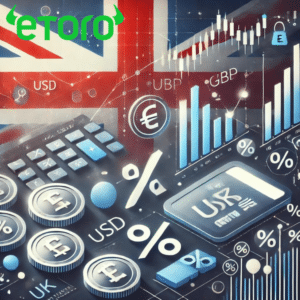
FAQs
What is the conversion fee on eToro, and when does it apply?
The conversion fee is applied when depositing or withdrawing funds in a currency other than USD. eToro accounts are in USD, so if you deposit or withdraw in GBP, for example, you’ll be charged a conversion fee based on the currency and payment method.
How much is the commission fee for stock trades on eToro?
Starting August 2024, stock trades on eToro will incur a commission fee of $1 or $2, depending on your country and the stock exchange. This fee applies to all stock trades but does not affect ETF trades, which remain commission-free.
What are spread fees on eToro, and how are they calculated?
Spread fees represent the difference between the buy and sell prices of an asset. eToro adds a markup to this market spread, and the cost varies depending on the asset. More liquid assets like forex pairs typically have tighter spreads, while less liquid ones may have wider spreads.
When do overnight fees apply on eToro CFD trades?
Overnight fees, or rollover fees, are charged when you hold a CFD position overnight. These fees represent the cost of leverage and vary depending on the asset and the duration of the trade. They apply to both long and short CFD positions.
Is there a fee for withdrawing funds from my eToro account?
Yes, eToro charges a fixed withdrawal fee of $5 for all withdrawal requests, regardless of the amount. This fee is applied each time you withdraw funds from your account, so it’s advisable to consolidate withdrawals to reduce costs.
More Like This
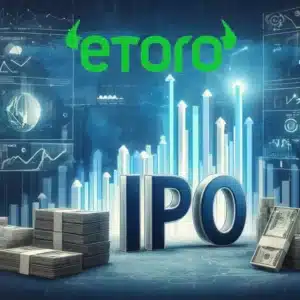
How to Invest in IPOs on eToro in 9 steps: 2025 Best Practise Guide
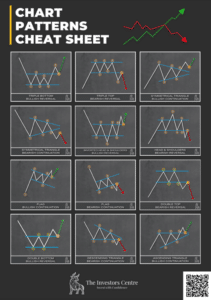

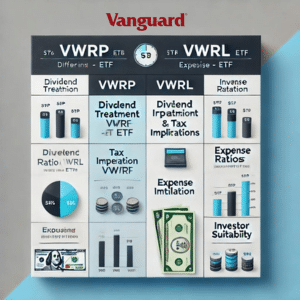
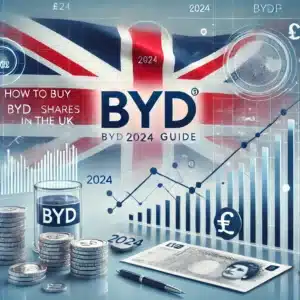
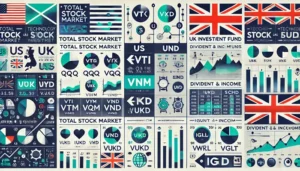
What are the UK Equivalents of Popular US Investment Funds in 2025?


How to Buy Berkshire Hathoway Shares (BRK) in the UK: 2024 Guide



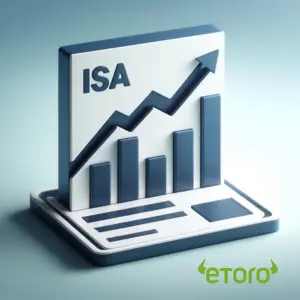
Gain Access to Our #1 Recommended Investment Platform in the UK
eToro is a multi-asset investment platform. The value of your investments may go up or down. Your capital is at risk.


